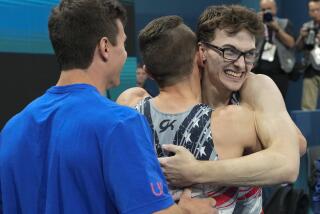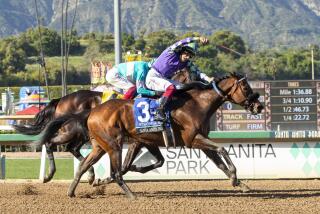Red Tape Fetters Olympic Hopeful and His Horse
- Share via
Steffen Peters and his horse Udon glide through the complicated movements of dressage like quicksilver, a demonstration of seemingly effortless riding that has placed the 27-year-old Escondido man in the Western United States’ top ranking for the equestrian event.
Peters, sitting ramrod straight but relaxed in the saddle, and Udon, neck arched royally and hoofs lifting daintily, seem to float over the ground as one. The two have a better than good chance of qualifying for the U.S. Equestrian Team to compete in the Grand Prix de Dressage in the Olympic Games this August.
There’s just one problem with this happy picture. Peters is not yet a U.S. citizen, and U.S. Olympic Committee rules require team members to be citizens of the countries for which they compete.
Standing between Peters and the Olympics is a mountain of bureaucratic red tape, which the German-born horseman finds much more difficult to traverse than the complicated routines of a dressage competition. Regulations of the Immigration and Naturalization Service and rules of the U.S. Olympic Equestrian Team have combined to trip Peters up. He cannot apply for U.S. citizenship until September--one month after the Olympics are held in Barcelona.
Rolling back the clock and granting Peters his naturalization papers before the 1992 Olympics seems too tough a task to accomplish, aides to Rep. Ron Packard (R-Carlsbad) admit. U.S. Equestrian Team officials say that, even if Peters’ supporters could accomplish the herculean feat and break the U.S. naturalization record, it’s already too late for him to compete for a place on the team.
Although Packard plans to request special legislation that would advance Peters’ eligibility date or outright grant him citizenship, the congressman holds out little hope.
“It seems that there are hundreds of such requests from Olympic hopefuls at this time,” said Carole Suarez, Packard’s press secretary. “It would not be a likely case that this would be granted.”
Peters, who operates a dressage training stable in the hills east of Del Mar, wasn’t thinking seriously of the 1992 Olympics when he emigrated from the small village of Wesel, outside Dusseldorf, in 1986. He wasn’t contemplating the worldwide competition when he applied for his green card for permanent alien residency status early in 1989 or when he married a San Diego woman in March of the same year.
Under immigration law, Peters would be eligible for U.S. citizenship three years after receiving resident alien status because of his marriage to a U.S. citizen. Unfortunately for Peters, INS officials compute his three-year waiting period from September, 1989--when they mailed his green card--not from the earlier application date.
U.S. Olympic Committee officials are in France now for the Winter Games and are of no help to Peters. A public affairs spokesman left at home in Colorado Springs admitted that the problem is a knotty one because Peters not only must be a U.S. citizen to compete on the U.S. Equestrian Team, he must also have held that citizenship for three years before being eligible to compete, under USOC rules.
“That three-year requirement can be waived by the committee,” USOC spokesman John Halpin said. “The citizenship requirement cannot. His best bet is to contact the equestrian team. If they really want him, they’ll be the ones to go to bat for him.”
Fiona Baan, director of dressage for the U.S. team, also sees no hope for Peters.
“I don’t see how he can qualify now to compete in the trials,” Baan said. “Technically, he should have been a U.S. citizen at the time of filing for the trials. I don’t know when he submitted his application, but the deadline was Jan. 28.”
The trials to pick the six U.S. team members for the dressage events are scheduled for early March. A month or so after that, the team will head for Spain for training and to acclimate its mounts to the new surroundings.
“I wouldn’t worry about Steffen Peters,” Baan said. “He’s a young fellow and I’m sure that we will see him in the future. He’s talented, and when he qualifies he will be a very welcome addition to the team.”
But Peters shakes his head at the prospect of the 1996 Olympics because his partner, Udon, is 14 years old now and at his peak of performance.
“In four years, who knows?” Peters said. “We bought him as a 2-year-old, and he will not work as well with anyone else. He always was a most difficult animal with a very short fuse. But we are a team.”
Udon, a Dutch Warmblood, is descended from hardy European cavalry horses, but his sire was a famous English thoroughbred, Lucky Boy, which gives the heavy animal the grace to perform the intricate steps required in dressage.
Peters and Udon trained with a well-known German dressage trainer before coming to the United States when Peters was 21. Udon, despite his quirks, “is a remarkable animal,” said Del Mar horsewoman Anne Kellerhouse, “and together they perform like a beautiful piece of music.”
Peters and Udon “are right up there in the standings,” Kellerhouse said, “and they are damned good.”
Peters thought of joining the German team, he said, but too late.
If he is not allowed to try out for the U.S. team, he said, he plans to go to Europe anyway, in June or July, and perhaps he’ll even stay for the Olympic Games, he said. As a spectator, though, not a competitor.
More to Read
Go beyond the scoreboard
Get the latest on L.A.'s teams in the daily Sports Report newsletter.
You may occasionally receive promotional content from the Los Angeles Times.






